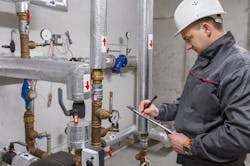A friendly competitor remarked,“Dave, you should become an inspector. Because you know the code, and I believe you’d be fair and even-handed while enforcing the code.”
“But I have a day job,” I protested.
“Do it when you retire. Man, I wish we still had inspectors who were retired plumbers — they knew what they were looking at. The third-party inspection agency inspectors give me the $%#!!” Not that I haven’t thought about being an inspector, it’s just that I’m not ready to retire, and I’d last about a week before being fired! “Why’s that?” he asked.
If I became an inspector
No. 1: No more antiquated permit application process! I’d streamline this process and bring it into alliance with today’s wireless world: smart phone, iPad, tablet, laptop and web-connected devices.
No. 2: No longer would the registered Master Plumber or anyone else be required to appear in person to obtain a permit. The notion that a professional business person (that is us ladies and gents) must interrupt his or her busy schedule to drive to various township and city buildings, find parking, plug a meter, and then wait for the permit clerk to finish phone calls (and be interrupted by still more phone calls) is the height of absurdity. It’s insulting. It’s demeaning. It’s a huge waste of otherwise productive time, and it adds unnecessary cost for the customer.
No. 3: My first targets would not be the licensed contractors who have tired of the permit “game.” They’re frustrated, and I feel that pain too. They (we) are competing with others who are not licensed, do not have proper levels of insurance, cheat by hiring so-called subcontractors to avoid overhead, and operate in plain sight without any fear of punishment.
I would work to eliminate the lopsided enforcement. Unlicensed contractors operate in plain sight without bothering to obtain permits or inspections and the officials turn a blind eye. "It costs too much to go after them."
I served on the plumbing board of one township for many years. A contractor installed the PHVAC in a new bank building. The electrical inspector notified the plumbing inspector who called me asking what should be done. He said the contractor told him he wasn't willing to pay for a local license (he was licensed in a nearby city that reciprocates with the township), obtain a permit, or pay for any inspections and that he would work in the township any time he wanted!
I suggested they needed to fine the character and enforce the code. No permit and no inspections? At the very least, a video inspection of the under-slab plumbing drain lines was warranted. The township decided to do nothing. Nothing? Seriously? As serious as a heart attack. If I was an inspector, there would have been hell to pay. That’s not fair to all of the pros who play by the rules.
No. 4: While my pay might be tied to an eight-hour day, I would take the time to visit the big box stores and follow folks who are carting off goods for which licensed pros are required to pick up permits and obtain inspections! No doubt why I’d be fired during my first week! From the homeowner perspective, they know a permit can trigger a new tax assessment.
The permit fees are often higher than warranted and they know the inspectors have virtually no real knowledge regarding the proper and safe installation of PHVAC products. But the harsh reality is neither do they and we pros have seen the installed dangers that get passed along to the next owners of those homes.
No. 5: When it comes to inspections, I would ensure the contractor and building owner(s) got what they are paying for — a thorough and professional inspection. While not all third-party inspection agencies rush through inspections, one example stands out in my memory. Rough-in inspection for a new large home (8,000-sq.ft.) and the 3rd party inspector was there for our multi-zone hybrid hydronic radiant, five central A/C with a sprinkling of inverter mini-splits too, and seven-bath rough in. While there, he was also inspecting the electrical and interior construction rough ins. Time on site? Fifteen minutes.
No. 6: Long gone are the days when retired contractors were sought out to be inspectors. Today's third-party inspection agencies can be difficult to contact, insist on scheduling inspections one to three days in advance, and seldom show up on time. Add to that the fees are open-ended, which is sometimes utilized to intimidate contractors with inspectors making up rules that don't exist.
No. 7: I would be accessible, and I would carry with me the commentary edition of the code book, so that we could discuss any issues needing correction before passing the work. Here’s why: We had installed two commercial kitchens in neighboring buildings and both were inspected back-to-back on the same morning.
In spite of both architectural drawings listing the three-compartment sinks as "dish-washing sinks," the inspector decided (based on absolutely nothing more than a whim) the second three-compartment sink was a food-prep sink. He refused to even discuss the issue and would not return my calls. So, I called him very early one morning, and when he answered, I explained that I have a commentary edition of the code book that clearly spells out in numerous code passages that this was not a food-prep sink. He said he wasn't interested in looking at that because "that's just someone's opinion."
No. 8: Every permit we obtain carries a $4.00 education fee to support the inspectors’ school, but few inspectors avail themselves of continuing education because they have to go on their own time and pay for classes out of their own pocket. At one point, I offered to provide the school with bullet-point lists for inspectors to follow to enhance and upgrade the quality of inspections. No dice — not interested. Anyone working in my code enforcement office as an inspector would be required to attend and pass proficiency tests. Read the column I wrote in 2007 titled “Hector the Inspector.”
No. 9: Then there are the Manual-J calculations. They, or another approved heat loss/gain calculation, would be required before granting a mechanical permit. No calculation — no permit. I have yet to have a township inspector give more than a passing glance at my heat loss/gain calculations. Quite frankly, most of our local code officials don't have sufficient knowledge to understand them, much less analyze the information.
Given the existing conditions, it's no wonder so many contractors and homeowners/business owners do not want to obtain permits or inspections! Me an inspector? They’d bring in The Donald just to tell me “You’re fired!”
All Dave Yates material in print and on Contractor's Website is protected by Copyright 2015. Any reuse of this material (print or electronic) must first have the expressed written permission of Dave Yates and Contractor magazine. Please contact via e-mail at: [email protected].
About the Author
Dave Yates
Dave Yates material in print and on Contractor’s Website is protected by Copyright 2017. Any reuse of this material (print or electronic) must first have the expressed written permission of Dave Yates and Contractor magazine.

